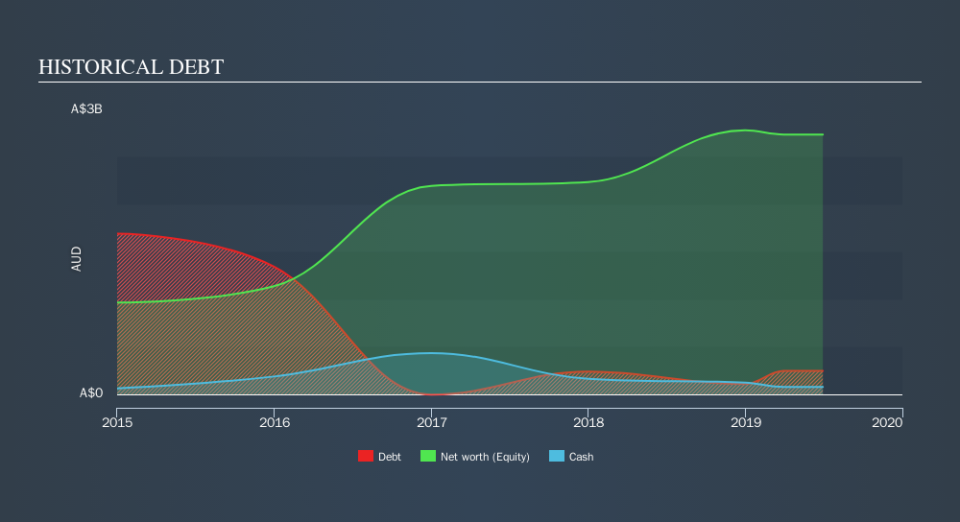Does Viva Energy Group (ASX:VEA) Have A Healthy Balance Sheet?

David Iben put it well when he said, 'Volatility is not a risk we care about. What we care about is avoiding the permanent loss of capital. When we think about how risky a company is, we always like to look at its use of debt, since debt overload can lead to ruin. We note that Viva Energy Group Limited (ASX:VEA) does have debt on its balance sheet. But the real question is whether this debt is making the company risky.
What Risk Does Debt Bring?
Generally speaking, debt only becomes a real problem when a company can't easily pay it off, either by raising capital or with its own cash flow. Ultimately, if the company can't fulfill its legal obligations to repay debt, shareholders could walk away with nothing. However, a more common (but still painful) scenario is that it has to raise new equity capital at a low price, thus permanently diluting shareholders. Of course, debt can be an important tool in businesses, particularly capital heavy businesses. When we think about a company's use of debt, we first look at cash and debt together.
Check out our latest analysis for Viva Energy Group
What Is Viva Energy Group's Net Debt?
The image below, which you can click on for greater detail, shows that Viva Energy Group had debt of AU$246.2m at the end of June 2019, a reduction from AU$289.9m over a year. However, it does have AU$78.1m in cash offsetting this, leading to net debt of about AU$168.1m.
How Strong Is Viva Energy Group's Balance Sheet?
We can see from the most recent balance sheet that Viva Energy Group had liabilities of AU$2.40b falling due within a year, and liabilities of AU$2.56b due beyond that. On the other hand, it had cash of AU$78.1m and AU$1.36b worth of receivables due within a year. So its liabilities total AU$3.52b more than the combination of its cash and short-term receivables.
This deficit is considerable relative to its market capitalization of AU$3.64b, so it does suggest shareholders should keep an eye on Viva Energy Group's use of debt. This suggests shareholders would heavily diluted if the company needed to shore up its balance sheet in a hurry.
In order to size up a company's debt relative to its earnings, we calculate its net debt divided by its earnings before interest, tax, depreciation, and amortization (EBITDA) and its earnings before interest and tax (EBIT) divided by its interest expense (its interest cover). The advantage of this approach is that we take into account both the absolute quantum of debt (with net debt to EBITDA) and the actual interest expenses associated with that debt (with its interest cover ratio).
Given net debt is only 0.49 times EBITDA, it is initially surprising to see that Viva Energy Group's EBIT has low interest coverage of 1.9 times. So one way or the other, it's clear the debt levels are not trivial. Shareholders should be aware that Viva Energy Group's EBIT was down 38% last year. If that earnings trend continues then paying off its debt will be about as easy as herding cats on to a roller coaster. When analysing debt levels, the balance sheet is the obvious place to start. But it is future earnings, more than anything, that will determine Viva Energy Group's ability to maintain a healthy balance sheet going forward. So if you want to see what the professionals think, you might find this free report on analyst profit forecasts to be interesting.
Finally, while the tax-man may adore accounting profits, lenders only accept cold hard cash. So we clearly need to look at whether that EBIT is leading to corresponding free cash flow. Looking at the most recent three years, Viva Energy Group recorded free cash flow of 25% of its EBIT, which is weaker than we'd expect. That weak cash conversion makes it more difficult to handle indebtedness.
Our View
To be frank both Viva Energy Group's interest cover and its track record of (not) growing its EBIT make us rather uncomfortable with its debt levels. But at least it's pretty decent at managing its debt, based on its EBITDA,; that's encouraging. Overall, it seems to us that Viva Energy Group's balance sheet is really quite a risk to the business. So we're almost as wary of this stock as a hungry kitten is about falling into its owner's fish pond: once bitten, twice shy, as they say. Given our hesitation about the stock, it would be good to know if Viva Energy Group insiders have sold any shares recently. You click here to find out if insiders have sold recently.
If, after all that, you're more interested in a fast growing company with a rock-solid balance sheet, then check out our list of net cash growth stocks without delay.
We aim to bring you long-term focused research analysis driven by fundamental data. Note that our analysis may not factor in the latest price-sensitive company announcements or qualitative material.
If you spot an error that warrants correction, please contact the editor at editorial-team@simplywallst.com. This article by Simply Wall St is general in nature. It does not constitute a recommendation to buy or sell any stock, and does not take account of your objectives, or your financial situation. Simply Wall St has no position in the stocks mentioned. Thank you for reading.

